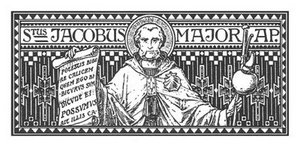 Saint James, the son of Zebedee, and brother of Saint
John the Apostle, was a Galilean. He was one of the first to be called to the
Apostolate, together with his brother, and, leaving his father and his nets, he
followed the Lord. Jesus called them both Boanerges, that is to say, sons of
thunder. He was one of the three Apostles whom our Savior loved the most, and
whom He chose as witnesses of His Transfiguration, and of the miracle by which
He raised to life the daughter of the ruler of the synagogue, and whom he
wished to be present when He retired to the Mount of Olives to pray to His
Father, before being taken captive by the Jews.
Saint James, the son of Zebedee, and brother of Saint
John the Apostle, was a Galilean. He was one of the first to be called to the
Apostolate, together with his brother, and, leaving his father and his nets, he
followed the Lord. Jesus called them both Boanerges, that is to say, sons of
thunder. He was one of the three Apostles whom our Savior loved the most, and
whom He chose as witnesses of His Transfiguration, and of the miracle by which
He raised to life the daughter of the ruler of the synagogue, and whom he
wished to be present when He retired to the Mount of Olives to pray to His
Father, before being taken captive by the Jews.
After the Ascension of Jesus Christ into Heaven, Saint James preached His Divinity in Judea and Samaria, and led many to the Christian Faith. Soon, however, he set out for Spain, and there made some converts to Christianity; among these were seven men who were afterwards consecrated as Bishops by Saint Peter, and were the first sent by him into Spain. Saint James returned to Jerusalem, and, among others, instructed Hermogenes, the magician, in the truths of the Faith. Herod Agrippa, who had been raised to the throne under the Emperor Claudius, wished to curry favor with the Jews; he therefore condemned the Apostle to death for openly proclaiming Jesus Christ to be God. When the man who had brought him to the tribunal saw the courage with which he went to martyrdom, he declared that he too was a Christian.+As they were being hurried to execution, he implored Saint James' forgiveness. The Apostle kissed him, saying: "Peace be with you." Thus both of them were beheaded; Saint James having a little before cured a paralytic. His body was afterwards translated to Compostella, where it is honored with the highest veneration; pilgrims flock thither from every part of the world, to satisfy their devotion or pay their vows. The memory of his natalis (eternal birthday) is celebrated by the Church today, which is the day of his translation. But it was near the feast of the Pasch that, first of all the Apostles, he shed his blood at Jerusalem as a witness to Jesus Christ.
Who but He that numbers the stars of the firmament could count the Saints, the penitents, the kings, the warriors, the unknown of every grade, the ever-renewed multitude, ceaselessly moving to and from the field of stars, whence Saint James shed his light upon the world? Ancient accounts tell us of a mysterious vision granted to the founder of Christian Europe. One evening after a day of toil, Saint Karl the Great (Charlemagne), standing on the shore of the Frisian Sea, beheld a long belt of stars, which seemed to divide the sky between Gaul, Germany, and Italy, and crossing over Gascony, the Basque territory, and Navarre, stretched away to the far-off province of Galicia. Then Saint James appeared to him and said: "This starry path marks out the road for thee to go and deliver my tomb; and all nations shall follow after thee." And Saint Karl, crossing the mountains, gave the signal to all Christendom to undertake those great crusades, which were both the salvation and the glory of the Latin races, by driving back the Moslem plague to the land of its birth.
When we consider that two tombs formed, as it were, the two extreme poles of this movement unparalleled in the history of nations: the one wherein the God-Man rested in death, the other where thy body lay, O son of Zebedee, we cannot help crying out with the Psalmist: Thy friends, O God, are made exceedingly honorable! (Ps. 138: 17). And what a mark of friendship did the Son of Man bestow on His humble Apostle by sharing His honors with him, when the military orders and Hospitallers were established, to the terror of the Crescent, for the sole purpose, at the outset, of sheltering and protecting pilgrims on their way to one or the other of these holy tombs! May the heavenly impulse gather once more at Compostella the sons of the former clients of Saint James. We, at least, will imitate Saint Louis before the walls of Tunis, murmuring with his dying lips the collect of today's Feast; and we will repeat in conclusion: "Be Thou, O Lord, the Sanctifier and Guardian of Thy people; that defended by the protection of thy Apostle James, they may please Thee by their conduct, and serve Thee with secure minds."
Abbot Gueranger
The Liturgical Year


Leave a comment